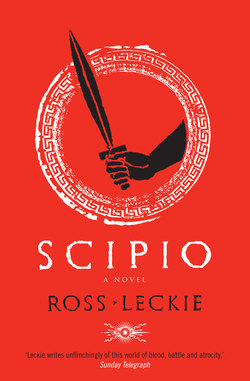Читать книгу Scipio - Ross Leckie - Страница 5
На сайте Литреса книга снята с продажи.
PROLOGUE
ОглавлениеThe deep drums throbbed as the senators, their togas white, their faces grave, filed past us to their seats. My brother and I stood straight, still, on the platform in the centre of the chamber, looking forward, arms by our sides, in the way we had agreed. I could feel Cato, I could smell him as, last as usual, he approached. I had promised myself not to look at him. But as he passed, I had to meet his eyes. I saw hate in their deadly blue, pure aquamarine – who could doubt his bastard Celtic blood? – under those beetling brows, the low, bald, peasant head.
Our eyes met, and he sneered. Walking past, he raised the index finger of his right hand. The sign for victory. He thought that he had won.
The drums stopped. The senators sat down. The voice of Fabius Pulcher, father of the house, rang out. ‘Patres et conscripti, senators of Rome, the trial of the brothers Scipio is resumed.’
One hundred senators sat in silent rows around us. Behind them, their armour shining, at attention, the soldiers of the senatorial guard ringed the room. Many of them had served me, or my brother. They had fought for me, as I had fought for Rome, in the mountains of Celtiberia and Asia, under far and foreign skies, in the valleys and plains of Gaul and Italy, in the marshes of Macedonia, across Africa’s desert sands.
I was never beaten. I saved Rome from the vengeance of Hannibal, and Carthage from the vengeance of Rome. I defeated Philip of Macedon, and Antiochus whom they called the Great. I brought honour to my stock. I gave Rome her army. I sought, as had my forefathers beyond men’s memory, to serve the Republic of Rome. Under my hand, Rome has mastered the world. From being a city state, nearly destroyed by Hannibal, Rome has become the city and the world, and all this I gave to her because Rome has been my life, my love, my song.
Now, those who owe me their very power of speech have used it to impeach me. The people say I am a god, my peers but a man. I know that is what I am. And as a man I feel utterly alone. The injustices of life, the absurdities, buzz in my brain like flies, fetid, black. I have lived life to the full, and now I know the tears of things.
Fabius stood up. The silence was chilling. The light from the high cupola was strong. I saw, on this last day of our trial, a new adornment of the court. On a low table beside the prosecutor’s lectern sat the voting urn, and before it in neat rows a hundred small tablets of boxwood, covered in wax. On these, in time, my peers would write one letter with styluses: L for libero, acquittal, C for condemno, condemnation – two lives to be determined by two letters.
‘Senators,’ Fabius called out. ‘What is the charge today, and who brings it?’
Cato moved with his crab-like limp from the benches to a lectern on our right. He claims to have been wounded in some war. I did not see him there, and there have been no wars in our lifetime without me. I believe the story that he was, in fact, kicked by a mule. That is how he broke his hip.
What a runt, I thought. You can hardly see him above the lectern from which he will prosecute his case. That vulgar voice. After all these years in Rome, his accent is still strong.
‘The last of the charges, Fathers, is extortion, and I, Marcus Porcius Cato, bring it, on behalf of the Senate and people of Rome.’
‘Whom,’ asked Fabius, ‘do you accuse?’
‘These two men before you, Lucius Cornelius and Publius Cornelius Scipio – whom,’ he said with contempt, looking straight at me, ‘they call’ – he spat out the word – ‘Africanus.’
‘And what penalty do you ask for?’
‘From the evidence I have already brought you, Fathers, and from what I will tell you today, there can be only one penalty. That, as the law demands, is death, by strangulation.’
‘Very well, begin.’
That was almost a month ago. We are waiting for judgment, on our bond not to flee from Italy, I here at my villa on the coast at Liternum, my brother at his house in Rome. The bond was the final insult. ‘I have never fled from anything,’ I said. ‘Shall I now flee from Rome?’
I might hear the verdict tomorrow. It might take months. The Senate must heed the voice of the people. But through almost thirty years as a soldier, I have learnt to live life without fear. By sickness or sword – or strangulation – no one can tell when it will end.
My brother seeks in wine a black oblivion. My solace is in my farm here, and this account that I am dictating to Bostar, my secretary and my friend. The Senate, or the gods, will take my life from me. But this account they cannot kill. Bostar will copy it when I have finished, and see the copies safe.
Even without it, I shall not wholly perish. Neither time nor man, not famine, tempest or disease can destroy what I have done. The deeds of Scipio are his marred, magnificent memorial. What you now read is their account. A building up, a breaking down: the life of Scipio before, soon, it is time for him to die.
